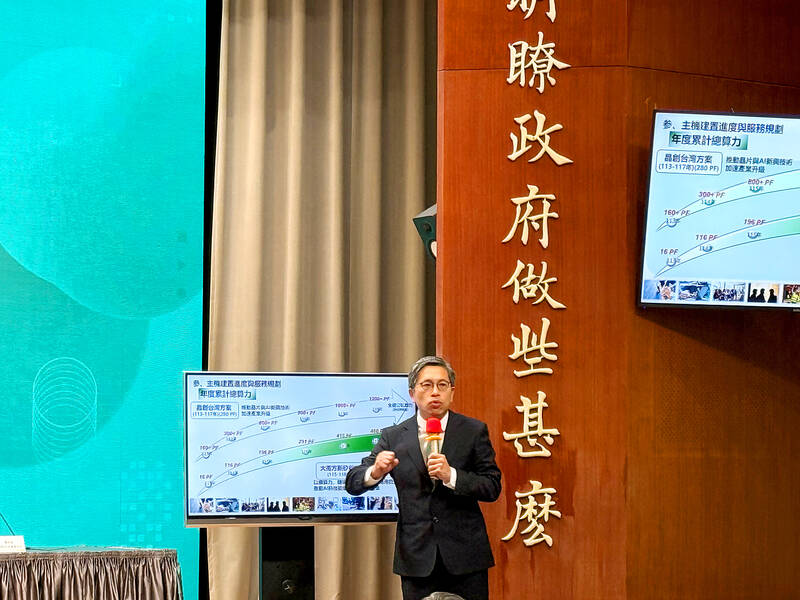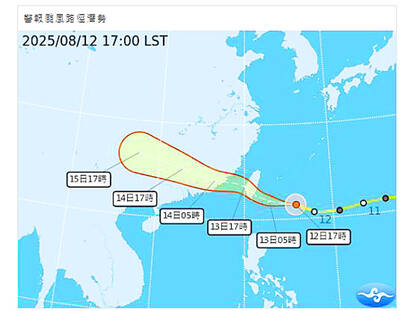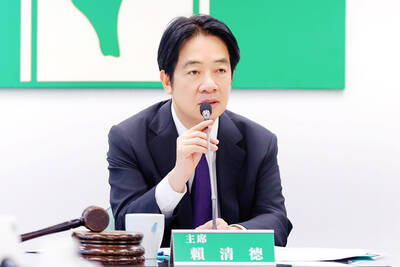The government would intensify efforts to bolster its “Sovereign Artificial Intelligence [AI]” program by setting a goal of elevating the nation’s collective computing power in the public and private sectors to 1,200 peta floating points per second (petaflops) by 2029, the Executive Yuan said yesterday.
The goal was set to fulfill President William Lai’s (賴清德) vision of turning Taiwan into an “AI island.”
Sovereign AI refers to a nation’s capabilities to produce AI using its own infrastructure, data, workforce and business networks. One petaflop allows 1 trillion calculations per second.

Photo: Chang Chia-ming, Taipei Times
As of Nov. 19 last year, Taiwan was globally ranked No. 11 for having computing power of 103 petaflops, according to the Top500 project, which ranks and details the 500 most powerful non-distributed computer systems in the world, the National Science and Technology Council (NSTC) said yesterday at a news conference after the weekly Cabinet meeting.
The US tops the list with 6,475 petaflops, followed by Japan, Italy, Switzerland, Germany, Finland, China, France, Spain and South Korea.
National Applied Research Laboratories president Tsai Hung-yin (蔡宏營) said the government has planned to upgrade the supercomputer’s power and energy use efficiency through the Taiwan Chip-based Industrial Innovation Program and Big South New Silicon Valley Project, with the goal of reaching 480 petaflops in the public sector by 2029.

Photo: Chung Li-hua, Taipei Times
In the same year, the accumulative computing power would top 1,200 petaflops when efforts from the private sector are added, Tsai said.
The nation’s AI supercomputer is to begin operations in May, he added.
The government is planning to build a large cloud data center to accommodate servers for supercomputers and large data storage facilities, the council said.
The cloud data center in the Southern Taiwan Science Park (南部科學園區) is scheduled to open at the end of this year, while the AI computing data center in Tainan’s Shalun (沙崙) area is to open by 2029, the council said.
NSTC Deputy Minister Lin Faa-jeng (林法正) said that the draft of the AI basic act has yet to be delivered to the Legislative Yuan for deliberations as the Executive Yuan is still reviewing it.
Meanwhile, the Executive Yuan yesterday also unveiled the management guidelines governing the use of generative AI among government agencies, after imposing a comprehensive ban on government agencies using China-developed AI software DeepSeek last week.
The government has three main measures to regulate the use of generative AI systems among government agencies, including establishing an AI Evaluation Center (AIEC), setting out an AI application manual and composing user guidelines for cybersecurity products that could compromise national security, the Ministry of Digital Affairs (MODA) said.
Taiwan’s AIEC, which was established in December 2023, leads the development of methods to evaluate AI applications by referencing similar ones abroad and building an AI evaluation lab and certification institution, the ministry said, adding that the government and AI users in the private sector have submitted AI applications for evaluation.
The Principles on Limiting Harmful Products Against Cybersecurity Used by Government Agencies (各機關對危害國家資通安全產品限制使用原則) stipulates that a government agency that uses products that could risk compromising cybersecurity, disrupt the operations of the government or destabilize society should list reasons for doing so and secure the approvals from the agency’s chief cybersecurity official, cybersecurity officials of higher authorities and the MODA, the ministry said.
The government should also make a list of similar products that are in use, it added.
The agency must require such products to be used in specific areas and by specific individuals, the ministry said, adding that the use of such products must be discontinued immediately if reasons for using them no longer exist.
These products must be plugged to computers that do not contain personal or other sensitive data and are not connected to the Internet, the ministry said.
If public universities or research institutions in Taiwan need to use DeepSeek for research, they need to apply for approval in accordance with regulations and take necessary control measures before using it, the ministry said.

GET TO SAFETY: Authorities were scrambling to evacuate nearly 700 people in Hualien County to prepare for overflow from a natural dam formed by a previous typhoon Typhoon Podul yesterday intensified and accelerated as it neared Taiwan, with the impact expected to be felt overnight, the Central Weather Administration (CWA) said, while the Directorate-General of Personnel Administration announced that schools and government offices in most areas of southern and eastern Taiwan would be closed today. The affected regions are Tainan, Kaohsiung and Chiayi City, and Yunlin, Chiayi, Pingtung, Hualien and Taitung counties, as well as the outlying Penghu County. As of 10pm last night, the storm was about 370km east-southeast of Taitung County, moving west-northwest at 27kph, CWA data showed. With a radius of 120km, Podul is carrying maximum sustained

President William Lai (賴清德) yesterday criticized the nuclear energy referendum scheduled for Saturday next week, saying that holding the plebiscite before the government can conduct safety evaluations is a denial of the public’s right to make informed decisions. Lai, who is also the chairman of the Democratic Progressive Party (DPP), made the comments at the party’s Central Standing Committee meeting at its headquarters in Taipei. ‘NO’ “I will go to the ballot box on Saturday next week to cast a ‘no’ vote, as we all should do,” he said as he called on the public to reject the proposition to reactivate the decommissioned

US President Donald Trump on Friday said that Chinese President Xi Jinping (習近平) told him China would not invade Taiwan while Trump is in office. Trump made the remarks in an interview with Fox News, ahead of talks with Russian President Vladimir Putin over Moscow’s invasion of Ukraine. “I will tell you, you know, you have a very similar thing with President Xi of China and Taiwan, but I don’t believe there’s any way it’s going to happen as long as I’m here. We’ll see,” Trump said during an interview on Fox News’ Special Report. “He told me: ‘I will never do

EXCEPTIONS: Some people could be allowed to reclaim citizenship for humanitarian reasons or because of their contributions to the nation, the interior ministry said Taiwan would soon unveil new rules banning Taiwanese residents of China from reclaiming their citizenship if they participated in Beijing’s propaganda activities, the Ministry of the Interior said on Monday. The measures were drafted following President William Lai’s (賴清德) March 13 directive that the government counter China’s espionage and influence campaigns aimed at undermining Taiwan’s sovereignty, the ministry said in a preview of the rules. The changes would affect Taiwanese who lost their citizenship after becoming permanent residents of China or obtaining passports issued by China, it said. Under the measures, former Taiwanese nationals living in China who had made statements denying the